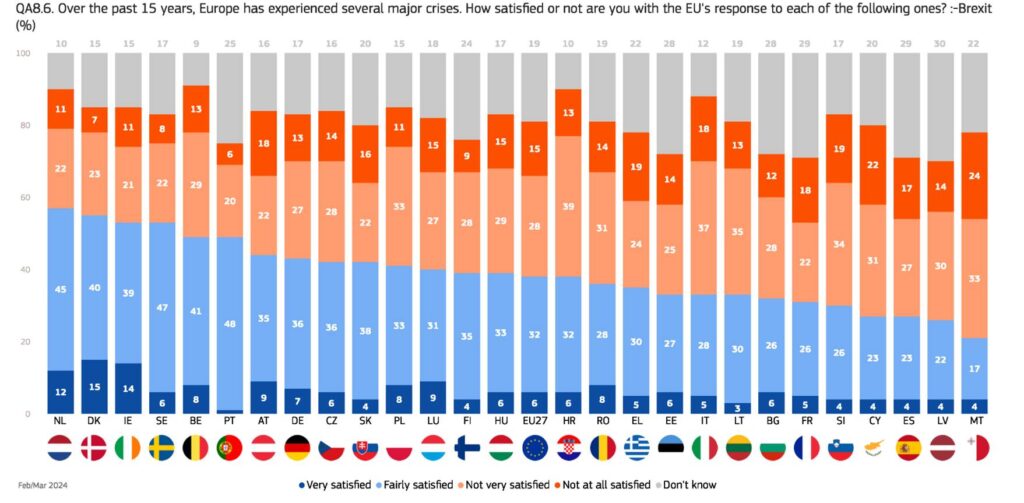European elections: high turnout expected in EU, low among EU citizens in UK
With the election of the European Parliament approaching, a growing number of EU citizens say they plan to vote, according to a survey raising expectations about a higher than usual turnout. But EU citizens in the UK are less likely to say they will participate, based on a separate research commissioned by the European Parliament.
Some 60% of respondents in the EU-wide Eurobarometer survey published on Wednesday said they are interested in the European elections, which will take place between 6 and 9 June this year. An even higher proportion, 71%, said they are likely to vote, 10 percentage points more than before the 2019 elections. For people above the age of 40, the figure reaches 74%.
The most likely to say they will vote are Danish (87%), Dutch (86%) and Swedish citizens (81%), while the least likely are Bulgarian (50%), Estonian (52%) and Portuguese nationals (57%).
Presenting the results, Jaume Duch Guillot, Director General and European Parliament spokesperson, said: “All the figures concerning the interest of these elections are higher than ever… Of course, we know that the actual turnout is always lower than the figures… But we do have grounds to… expect a higher turnout”.
One of the reasons for the growing interest compared to the past, according to the survey, is the international situation, as 81% said that voting is more important due to that.
European Parliament President Roberta Metsola, commented: “Europeans are aware that the stakes are high at the ballot box, and that voting is even more important in the current geopolitical context.” She called on EU citizens to vote “to reinforce European democracy and to shape the future of Europe.”
EU citizens in the UK
EU citizens living in the UK have the right to vote in the European elections. But despite being more interested in the EU than the average EU population, they are less likely to vote, a separate survey commissioned by the European Parliament in 2023 revealed.
Although the two surveys cannot be exactly compared because they were carried out at different times and with a different methodology, they give an indication of distinctive attitudes towards the EU and the elections.
Among respondents in the UK, 33% said they are very likely to vote and 25% that they are not, compared to 14% across the EU.
The most likely to vote are German (66%), Italian (66%) and Polish (58%) citizens, followed by French (57%), Spanish (46%), Hungarian (43%), Portuguese and Romanian nationals (42%). The least likely to participate are Latvian, Lithuanian and Bulgarian respondents.
With the exception of Poland, citizens from countries that joined the EU after 2004 appear less interested in the vote.
The attitudes in the UK may be explained by the fact that it is more difficult to vote from abroad and that these elections are seen to “have less direct impact” over people’s lives, the report says. All respondents also mentioned a lack of information.
Views about the EU
Among participants in the Eurobarometer survey presented on Wednesday, 47% said they see the EU in a positive light, 60% consider EU membership a good thing and 71% agreed that their country has benefited. 73% also said that the EU has an impact on their daily life.
The positive image of the EU reached its highest levels during the COVID-19 pandemic and after Russia’s invasion of Ukraine, the survey shows. The countries with the most positive views are Portugal, Ireland and Sweden, while those with the least are France, Austria and Czechia.
EU citizens living in the UK tend to see the EU more positively, with 65% on average having a positive view. The most positive were German (82%), Dutch (78%), Portuguese and French respondents (73%, a significant difference compared to 37% in France).
In the UK, 71% of Italian and Spanish citizens said they have a positive image of the EU, compared to 46% and 40% in the respective countries. Similarly, 68% of Poles in the UK have a good opinion of the EU, against 51% in Poland. For Romania, however, the proportions were reversed, with 48% in UK having a positive opinion against 50% in Romania.
Bulgarians in the UK are the most likely to hold negative views of the EU (39%, against 19% in the home country).
Views about Brexit
The Eurobarometer survey also shows areas in which people hold critical views about the European Union. 50% were satisfied with the EU’s response to the Covid-19 pandemic, but with regard to Brexit, the economic situation, the war in Ukraine, climate change and migration, the proportion of those ‘not satisfied’ was higher than the ‘satisfied’.
On Brexit, 43% of EU citizens are not happy with the EU response, while 38% are satisfied. The most satisfied are Dutch, Danish, Irish and Swedish nationals, while Spanish (27%), French (31%) and Italians (33%) are among the least.

In the UK, over a quarter of EU citizens said they felt more European as a result of Brexit.
Top priorities
Looking at the electoral campaign, people across the EU said the fight against poverty and social exclusion (33%), public health (32%), the economy, as well as EU defence and security (31%) should be the main priorities, followed by climate change (27%).
Health and defence have become more prominent after the pandemic and Russia’s invasion of Ukraine.
The main values Europeans would like the European Parliament to focus on are peace (47%), democracy (33%), the protection of human rights (24%), freedom of speech and thought (21%) and the rule of law (20%). Peace is the most mentioned answer in 26 out of 27 countries.
For EU citizens in the UK, rising prices and the economic situation were the most important issues. But the relationship between the UK and the EU and the rights of EU citizens in the country are also seen as top issues for these elections.
Claudia Delpero © Europe Street News
This article is published in cooperation with French Morning London, El Ibérico, Londra Italia, Londynek and Ziarul Românesc as part of a public information project about the European elections funded by the European Parliament office in London.
Find the article in Polish, Romanian, Spanish, Italian and French.
Photo Daina Le Lardic © European Union 2020 – Source : EP
Europe Street News is a news service on the European Union and citizens’ rights. We are fully independent and we are committed to providing factual, accurate and reliable information. As citizens’ rights are at the core of democracy, our website and newsletter are free to read, so we welcome contributions to support our work. Thank you!




